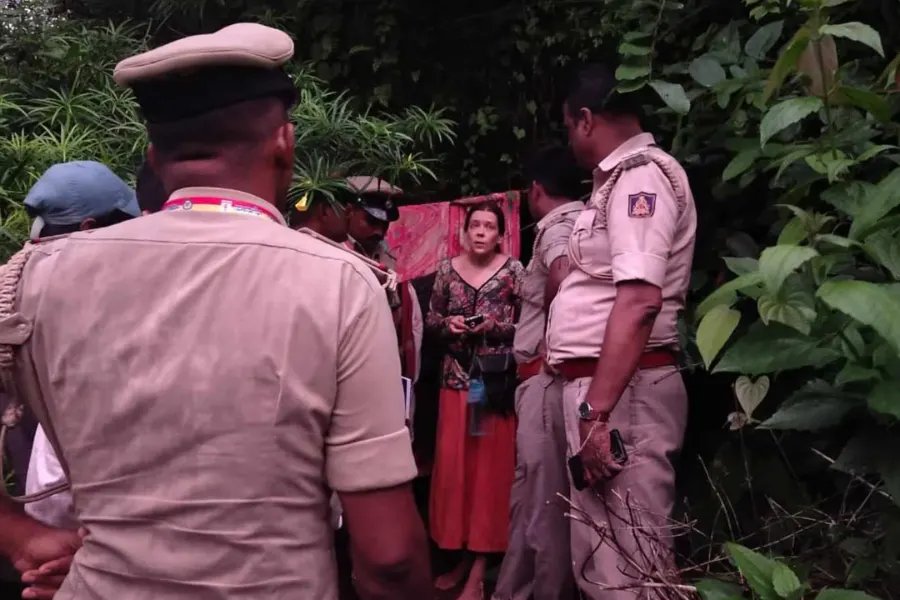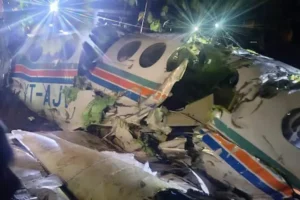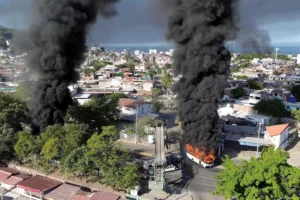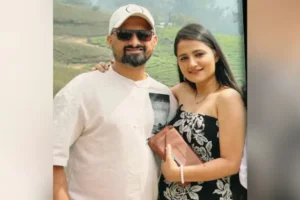
Russian woman Karnataka cave: Russian national Nina Kutina told an impassioned and moving story about living in the wilderness — but also her frustrations with humanity. After it was discovered that she was living in a cave with her two young daughters near Gokarna in Uttara Kannada district of Karnataka. Her story is now reported by several recent news articles. It fuels discussions around the individual freedoms of people, mental health, child protection, and immigration.
In Nature, ‘Only Afraid of Humans, Not Creatures’
Kutina, 40, was said to have been living off the grid for many years with her daughters in a remote cave surrounded by a thick forest. The Karnataka police said that her visa expired many years ago. Long before her children were born in India. Still, she chose to live a life that was detached from society, its structures, and its systems.
In a WhatsApp message, sent to local authorities after her relocation to a women’s centre in Karwar, Kutina expressed grief for having to leave the life she found valuable. “In all our lives, a snake never once harmed us.” Not one creature harmed us. “For many years, the only thing we were afraid of was humans,” she said.
She described their cave dwelling as comfortable and restorative, asserting that rain, health, wildlife, and nature offered no real danger to them, unlike people. Her comments were not merely emotionally charged. Also indicative of a profound disconnect she experienced from modern governance structures and societal norms.
‘Living in a cell without a sky’
According to officials, the family was moved for their protection due to potential risks relating to landslides, poisonous snakes, and inclement conditions in the wooded area. However, Kutina understood the move as a movement of depriving her liberty.
When describing the women’s centre, she explained that it was “without sky, without grass, without a waterfall” and equated it to a prison. They were moved “for safety”. She resisted the idea that contemporary housing offers any greater safety than nature, calling that notion a “naive fantasy.”
In her lengthy message, she continued to elaborate on what she considered unfounded fears and harmful systems. It uphold control based on unconsidered beliefs and insufficient education. “In their fancy homes, it looks like the cave but expounded,” she said, referring back to what she sees as the hypocrisy of child safegarding standards.
Legal Difficulties and Deportation Actions
Superintendent of Police Narayana M validated that Kutina came to India in 2016 on a business visa that expired in 2017. Then, she went to Nepal before she returned again to India. It was likely further complicating her immigration status.
Officials are currently in the process of deportation. But legal experts believe the process could be lengthy and complex. Especially considering it is unlikely either the government of India or Russia will assist with funds for the family to return.
Kutina’s passport was discovered near to the cave. Authorities are currently assessing the circumstances surrounding the children’s births. It is unknown to date if she received any medical assistance when she birthed the children. She has not provided any details of the father of the children.
Police Have Noted That She is ‘Disenchanted but Spiritually Grounded’
While she has been resistant to any re-entry into typical social surroundings, the police do not have her categorized as a risk. SP Narayana provided that she is “very disenchanted with humanity, but still sympathetic and spiritually grounded.”
He also confirmed that the two young daughters were born in India. They are currently being cared for by the Women and Child Welfare Department at the Women’s Reception Centre in Karwar. Officials say their safety remains a priority.
Wider Discussion About Safety and Fear
This unusual circumstance has initiated discussions on personal rights, different ways of living, and state involvement in making sure residents feel safe. Kutina’s message resonates with those who dispute dogmatic approaches to living. While others argue that her children should have had access to healthcare, education, and housing.
This ongoing recent news updates begs the question of safety, freedom, and genuine peace. And also, who decides these things.






o12sha
Thank you for your sharing. I am worried that I lack creative ideas. It is your article that makes me full of hope. Thank you. But, I have a question, can you help me?
Your point of view caught my eye and was very interesting. Thanks. I have a question for you.